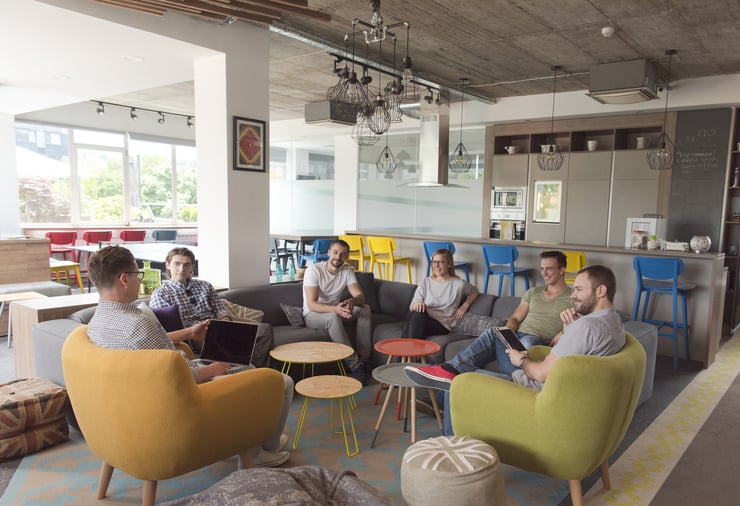What kind of people will I work with? This is a question many job seekers ask in their heads when interviewing for a new position. After all, you’d be spending 8+ hours per day around those folk, so they’d better be good! A peer interview gives you an opportunity to speak directly to your possible colleagues and impress them with your skills.
What Is A Peer Interview?
In a peer interview, a candidate speaks with their future coworkers rather than only HR and their direct supervisor. The purpose of a peer interview is to help the team determine whether they’d be comfortable with the new hire. It also helps HRs prevent biased hiring decisions, based solely on the opinion of one manager, rather than the group.
Typically, a peer interview is scheduled after other types of job interviews such as preliminary screening interviews, second manager interviews, and/or technical interviews. If you’ve been invited to a peer interview, it’s a good sign! The employer seriously considers you for the role.
What is a Peer Coding Interview?
A peer coding interview, also called a pair programming interview, is a collaborative coding session, where a candidate and an in-house developer jointly work on a coding problem. The candidate is usually asked to write code, while a peer interviewer provides guidance and feedback.
For example, an iOS software developer applicant to Facebook shared that his peer coding interview was done remotely. During it, he was given two programming questions to tackle over a 45-minute time span. During this time, he had to write the code and comment on his thought process, plus discuss the different limitations of each approach.
Peer-coding interviews are often used by companies to assess the candidate’s problem-solving and critical-thinking abilities in real time. For companies, it’s a good way to see you in action and understand your approach to collaboration a bit better. In this post, however, we’ll focus on general peer interviews.
How is a Peer Interview Organized?
Peer group interviews are similar to panel interviews. They usually feature a group of several interviewers, mostly from the team you’ll be working with.
For example, Google assembles hiring committees that:
- Have 4-5 members with prior interviewing experience. The members include peers and managers at various levels plus one cross-functional member.
- Review the candidate’s application package ahead of the meeting — resume, cover letter, earlier interview feedback, internal references, and recruiter notes.
- Hold a consensus vote on each candidate to decide on hiring and provide detailed feedback to the candidate afterward.
Other big employers like Facebook, IBM, and Microsoft practice a similar approach — and so do smaller startups.
How Long Does a Peer Interview Take?
A peer interview usually last about an hour, sometimes with extra time overruns if the conversation flows smoothly. Usually, an HR will let you know how much time to allocate for this interviewing round.

Sample Peer Interview Questions and Answers
While your peer interviewer(s) will likely want to learn about your personality and background, they will also ask questions to assess your core competencies and test your technical skills.
Therefore, you should prepare to answer a mix of general “ice breakers” such as a request to “tell more about yourself” or talk about “why you are interested in this position”.
Onward, several scenarios are possible depending on your role. The peer group may either focus on assessing your main technical skills — give some test project or problem-solving tasks. Or if you already did a separate technical interview, probe you with some behavioral interview questions.
While the exact set of questions differs from one company to another, here are some general peer interview questions to expect (with answers!):
1. What Type of Work Environment Do You Most Enjoy?
The goal of this peer interview question is to evaluate your cultural fit. Some organizations have a strong vertical hierarchy — others have a flat structure. Some value async work, while others prioritize in-person collaboration.
By asking this question, the interviewer wants to gauge your preferences. To answer this question perfectly, research the company in advance and align your response to its values.
Sample answer:
“I most enjoy a workplace where grassroots opinions get heard and acted upon. I believe that the best product suggestions come from users, so having effective feedback loops and bottom-up com streams is important for building things users will love. Personally, I also appreciate a work environment that encourages continuous learning and professional development, both horizontal and vertical”.
2. How Well Do You Adapt to Changes Such as New Policies?
Businesses are now moving at break-neck speeds, with market conditions changing almost daily. So almost every employer expects their employees to be open to changes and show a good degree of adaptability.
In your answer, briefly explain how you’ve dealt with the changes in the past:
“When the pandemic hit, our company had to rapidly roll out new safety protocols for all the maintenance stuff. As a supply manager, I had to facilitate its rapid execution. Apart from rapidly adjusting past procurement deals and locating new suppliers, I have also spoken to our staff to ensure that they understand the rationale behind these new protocols and answered all the concerns they had.”
3. What Are Your Biggest Strengths as a Group Player?
During a peer interview, you’ll meet your potential colleagues. Most of the would like to understand how you’ll contribute to the group and what working with you would be actually like, hence the above question.
Frame your answer in the following way:
“I would name three qualities: Good listener, careful observer, tactical executioner. I may not be the most vocal person during group discussions, but I listen carefully and analyze the information, before pitching in the suggestions. I like giving candid feedback and receiving constructive criticism without any bruised feelings. Then acting upon the approved ideas.”
4. Are You Comfortable With Working in a Multi-Generational Team?
Most companies now have at least four generations at the workplace — Boomers, Gen X, Millennials, and Gen Z. Each has a slightly unique take on preferred communication channels and managerial practices. So naturally, the interviewers want to know if you can adapt to such diversity.
The best answer to this peer interview question would be experience-based:
“On my last team, we had people in age brackets of 20 to 55 and I think it was one of the best teams I ever worked with. Sure, there were some occasional coms issues, but the people also brought very diverse perspectives and creative ideas, which we employed to make our product better.”
5. How Will You Add Value to the Current Team?
This is a tricker interview question as it’s meant to probe both your interest in this position, as well as the degree of your past research. If you have no idea what this team does, you’ll likely flop. So make sure you do thorough research in advance and review all your notes from the previous interview rounds about the responsibilities and tasks this role assumes.
Sample answer:
“As a Scrum manager, my main raison d’être is to help the team become self-organized and more productive. I’d like to improve knowledge-sharing workflows and implement post-mortem analysis, where everyone can safely talk about earlier flops and work from them. I also hope to share some of my love for good jazz music and home-cooked tacos if you’d allow this 🙂”
6. How Do You Typically Collaborate on a Shared Task?
This is a hypothetical interview question you may get in a peer interview. Typically, it prompts you to provide a quick walkthrough of your thinking process, elaborating on how you’d be doing the task. Be specific and explain why behind your actions.
Sample answer:
“As a UX designer, I have to work closely with front-end developers to ensure effective design handovers and implementation. Usually, I and my junior colleague jointly work on creating all design documentation. I create a master list of tasks that needs to be done — annotations for all screens, wireframe uploads, formatting tasks, etc. Then we split the list in half and worked in parallel on crossing off each task. If someone finishes earlier, they jump on to pick up the leftover tasks.”
7. Did You Ever Have a Conflict with Coworker? How Did You Handle It?
Creative disagreements and occasional arguments are inevitable in every workplace. However, such situations should always remain civil and culminate with a resolution. By asking this question, the interviewers want to understand how you can navigate the rougher edges.
Provide a quick story with some personal takeaways:
“At a recent project, we had a disagreement over the packaging design. Our lead designer insisted on doing a very simple, sleek, and on-brand product box, while the marketer agitated for creating a more creative unboxing experience to get some organic social media promotion. I’ve mediated the situation by offering to do a quick customer survey, where we asked consumers to rate our current packages using offered adjectives like “bland”, “luxurious”, “boring”, etc. After analyzing the sentiment data as a team, we decided to upgrade the original box to better match consumers’ expectations.”
8. If Your Current Teammates Had to Point Out One Area to Work On, What Would It Be?
An interview question about strengths and weaknesses comes up at almost every interview. This spin, however, prompts you to discuss your potential shortcomings in the area of collaboration and interpersonal skills. Try to be candid and describe a plausible weakness (and not something like “being too enthusiastic or too punctual”).
Apart from stating your weakness, be sure to tell how you’re working to address this. For example:
“I’m known to be somewhat impassionate, especially when I’m excited about something, and sometimes I tend to interrupt other speakers or start talking over them before they are finished. After being told about this behavior, I’ve started paying more attention to how and when I choose to speak up. I also put down notes as a way to capture my ideas in the flow without voicing them out loud.”
More General Sample Peer Interview Questions
- How would you describe yourself in five words?
- What attracted you to this role?
- What motivates you to do your best work?
- How do you handle conflicts at the workplace?
- Are you comfortable with async/remote work?
- Do you have a preferred communication/management style?
- What makes a good team player in your opinion?
- How do you usually provide feedback to others? Give an example.
- How do you coordinate work when doing a shared task?
- Can you describe a time when you had to delegate a task to a peer?
- Do you seek feedback from colleagues to improve your performance?
- Did you ever need to balance your own ideas and opinions with those of your peers?
Sample Nursing Peer Interview Questions
Peer interviews are common for nursing roles since this profession requires strong teamwork. Therefore, you should always practice some of the following questions:
- Describe a time when you had to work as a team to provide optimal patient care.
- How do you ensure effective teamwork when working with new colleagues during a shift?
- How do you ensure successful task execution when delegating to a peer?
- Did you ever have a conflict with a senior medical professional? How did you resolve it?
- How do you deal with disagreements among your colleagues on procedure delivery or task assignments?
- Have you ever had to adapt your nursing approach or style to work effectively with a peer from a different discipline or background?
- What’s your approach to cultivating a supportive work environment?
- How would you help a colleague deal with an emotional episode at the workplace?
- Have you previously contributed to the professional development of your colleagues?
- How do you ensure that all nurses are involved in patient care discussions and decision-making processes?
How To Prepare For A Peer Interview: 3 Pro Tips
Unlike panels, peer interviewing has a less perfunctory “flavor”. The tone and pace of conversation are faster, friendlier, and more action-oriented. Still, it doesn’t mean you should treat a peer interview as a casual chit-chat — you should come well-prepared. This set of tips should help you ace your game!
1. Hone Your Main Value Proposition
At this interviewing stage, your main goal is to persuade the team that not only you are a fine human being to deal with, but you can also deliver paramount value. In other words — become a reliable team asset.
To make your value prop too hard to pass on, try to understand what the company’s priority is at the moment and what impact you can deliver. For example, if you are a marketing manager, analyze the company’s latest campaigns. Try to identify some gaps or overlooked opportunities. Or think about how you could help them improve on the current results by referencing your past projects and experiences.
2. Try To Cultivate A “Connection”
Remember: in peer interviews, every team member has their say during the vetting phase. So don’t just focus on impressing the most senior person present or someone else you view as a leader of the group.
Be tactful and polite, chat up everyone present, and try to learn about their role, responsibilities, and communication preferences. One way to do so is to figure out a common subject and pursue it to create a sense of camaraderie within the group. For example, as a software developer, you can spin a conversation around your favorite tools or programming language that both you and the team use a lot.
3. Come With Your Set Of Questions
Peer interviews also provide you with the opportunity to learn more about your future coworkers, the role, and the organization as a whole. So don’t miss your chance to do so at the end of the job interview.
Prepare a set of 3-4 questions to ask in each peer interview. By asking the right questions you can better understand the current team dynamics, expectations towards the new hire, and the overall work culture. This is also a great way to demonstrate your interest in the role and clarify anything that hasn’t been covered.
Sample questions to ask your potential colleagues during a peer interview:
- What made you personally choose this company?
- How would you describe the management’s leadership style?
- Do you have extra training/upskilling programs?
- How do you usually deliver feedback?
- Do you enjoy the company culture?
- What’s your biggest team strength?
- What was the team’s most successful accomplishment up-to-date?
- Do you feel valued in this company?
- For how long do people stay with your team on average?
- How do you usually recognize each other’s achievements?
- What level of decision-making autonomy does each person have?
- How do you usually handle conflicts?
Final Thoughts
Peer interviewing offers you an opportunity to chat with your future colleagues — take advantage of it! Be proactive and try to get as many nuggets of information as you can to decide if this job is right for you. At the same time, put your best foot forward too! Don’t be shy to talk about your hard skills and place an extra emphasis on your interpersonal skills.







Very good article! Thank you for writing.